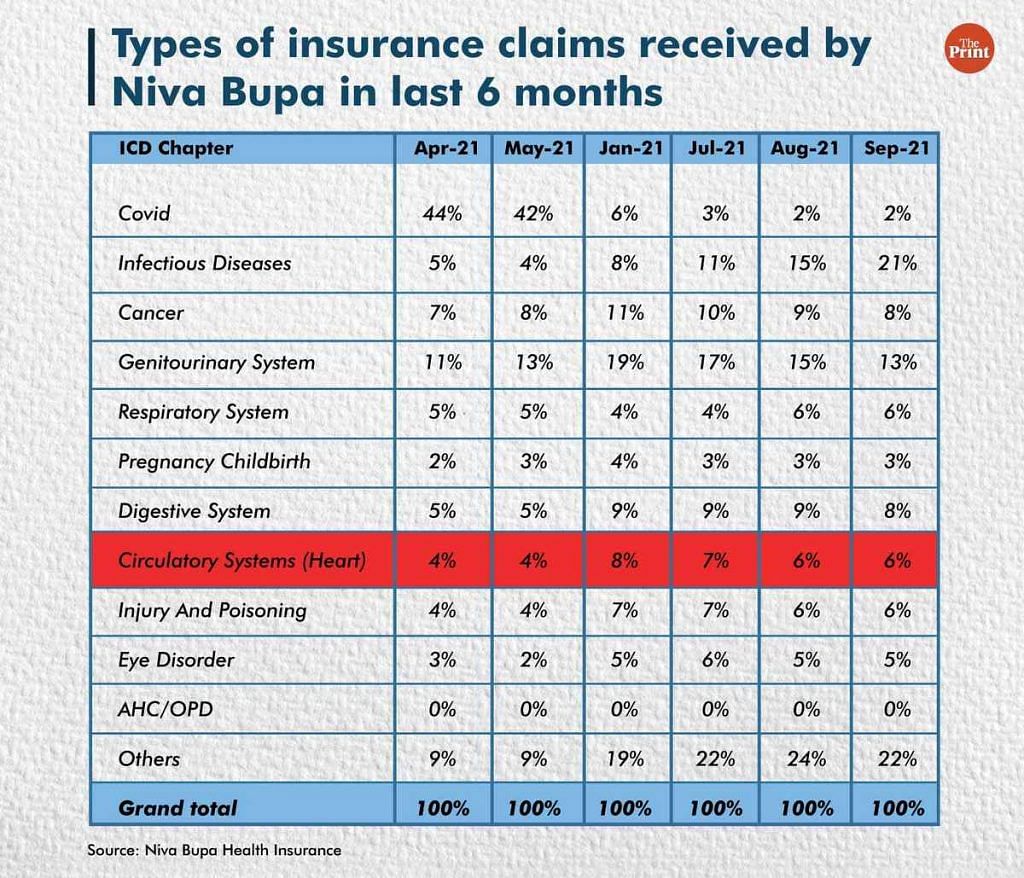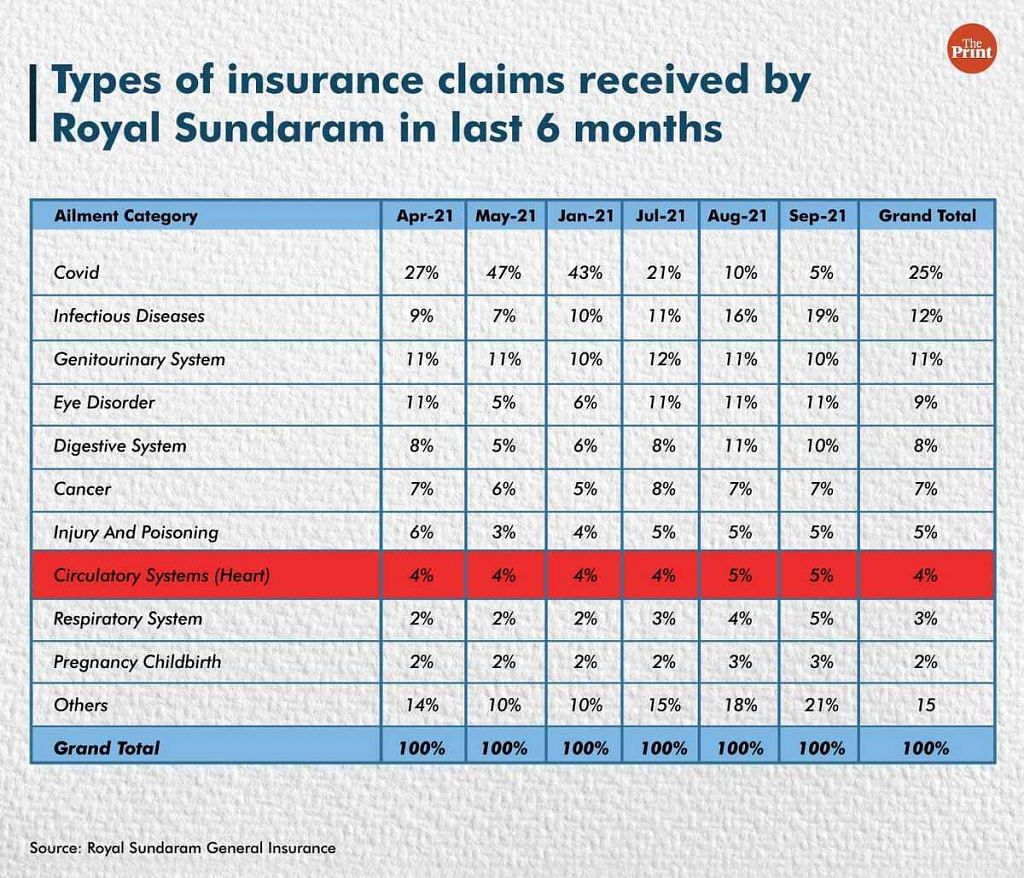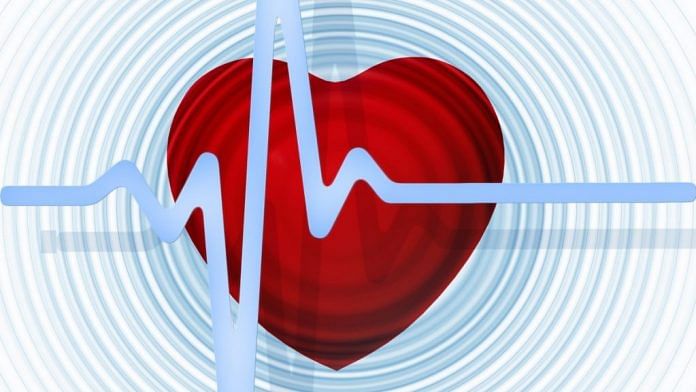New Delhi: The number of patients seeking treatment for cardiovascular issues in India has seen a drastic increase in the last few months, doctors and medical insurance companies have told ThePrint.
Cardiologists said there has been a greater footfall in patients seeking treatment for heart-related ailments, while the insurance companies said the number of claims specific to cardiovascular diseases has also “doubled”.
“OPDs have been teeming with patients. In both the private and public institutes, the patient numbers have come up… Post-Covid, the numbers have tripled,” said Dr Prafulla Kerkar, professor emeritus at KEM Hospital in Mumbai and consultant at the Asian Heart Institute.
Experts say there’s a wide range of reasons behind this trend — from patients returning for treatment as the Covid situation inches towards normalcy, to a change in lifestyles.
However, the visible increase in the number of patients seeking treatment for cardiovascular issues doesn’t necessarily mean an increase in the incidence of cardiovascular issues, doctors said.
Also read: Risky to take aspirin if you don’t have heart attack, stroke history — US body reverses stand
Increased claims for heart issues
According to the Global Burden of Disease study, 24.8 per cent of all deaths in India take place due to cardiovascular diseases.
Data from Niva Bupa Health Insurance showed that claims for Covid-related ailments dipped drastically between April and September 2021 — to 2 per cent of all claims from 44 per cent.

The number of claims for infectious diseases increased to 21 per cent in September from 5 per cent in April. For cardiovascular issues, the proportion of claims went from 4 per cent in April up to 8 per cent in June and down again to 6 per cent in September.
Dr Bhabatosh Mishra, director (product, underwriting & claims) of Niva Bupa Health Insurance, told ThePrint that in absolute terms, the number of claims received in September was double what was received in April. “So far, we have settled around 2,500 cashless claim requests for cardiovascular ailments since April this year,” he said.
Nikhil Apte, chief product officer, product factory (health insurance) at Royal Sundaram General Insurance, told ThePrint that “heart cases are now significantly on the rise”.

“In our hospital claims, when we talk to our patients, there is also an increasing trend of mental health issues such as anxiety. Although this doesn’t lead to hospitalisation, we are definitely seeing that more customers are seeking help from psychiatrists. There has been an increase in mental health issues due to lockdown etc, and this is also partly leading to higher heart claims,” Apte said.
Kapil Mehta, co-founder of SecureNow Insurance Broker, confirmed that the industry was seeing an increase in demand for claims for cardiovascular issues. “But this is not just an insurance trend. Across the country, the incidence of cardiovascular diseases is increasing,” he said.
Mehta pointed out that in the short term, it’s the impact of long-Covid that “appears to be material”, while “in the medium term, diagnosis has increased as people are getting tested more often and also more aware of the disease”.
“In the long term, the lifestyle issues continue unabated. Covid worsened this as exercise came down for many,” he added.
Why footfall has increased
“The number of people seeking heart care has increased. This is because in the last 1.5 years, people stopped visiting doctors and hospitals,” Bengaluru-based cardiologist Dr Devi Shetty told ThePrint. “In the process, most of the early heart disease and early cancer (cases) have become advanced disease with poor long-term results.”
Dr Ambuj Roy, professor of cardiology at AIIMS New Delhi, concurred. “A lot of it is because of a backlog… Several institutions were closed down for elective procedures. Even for public sector hospitals, and AIIMS, elective operation theatres were closed for a long period of time and have just gotten back to working,” Roy said.
Beyond the backlog, however, a host of other issues could have also led to the increase in cases. Padma Shri awardee cardiologist Dr Upendra Kaul cited “sedentary life, the increase in the incidence of diabetes, high BP, obesity, lack of exercise, fast foods and stress at work and at home”.
Mumbai-based Dr Kerkar gave an example of how a change in lifestyle had become a tipping point. “I met up with a couple — husband and wife had come together. The husband was the patient and had gained a good 10 kg. Neither had ventured out of their house. The long Covid problem is existent, I agree,” he said. But he added that “the numbers are not huge”.
According to Kerkar, those who were earlier seeking treatment through teleconsultation have also started to come in.
“There was also misdiagnosis in some kinds of cases. There was one case in which the patient went from pillar to post suffering from breathlessness… The investigation became a CT scan as they were trying to pick up Covid-related problems. Then they noticed that the heart is big, so the cardiologist got involved, then we diagnosed the problem,” he said.
‘Sufficient infrastructure to cope’
However, despite the increase in patients, doctors say hospitals are likely to cope with the extra pressure.
“We have the infrastructure from before (Covid). I wouldn’t say it is overwhelmed. The Covid burden is at a bare minimum, and we’re back with full staff,” Dr Kerkar said.
Dr Shetty also agreed. “Fortunately, healthcare infrastructure available in the country is managing well with the current (Covid) numbers. We hope and pray that there will not be a large-scale third wave… This isn’t likely, but we need to keep our fingers crossed and stay well-prepared,” he said.
According to Dr Kaul, however, hospitals in major cities are likely to face issues if procedures like angioplasty are immediately required.
“If patients with acute heart attacks come, their treatment will need to be individualised. It is an issue which can be handled with joint operations from hospitals, government and administrators, insurance companies and several voluntary bodies,” he said.
(Edited by Shreyas Sharma)
Also read: Steep rise in heart disease risk among women as more take up full time work: Swiss study



